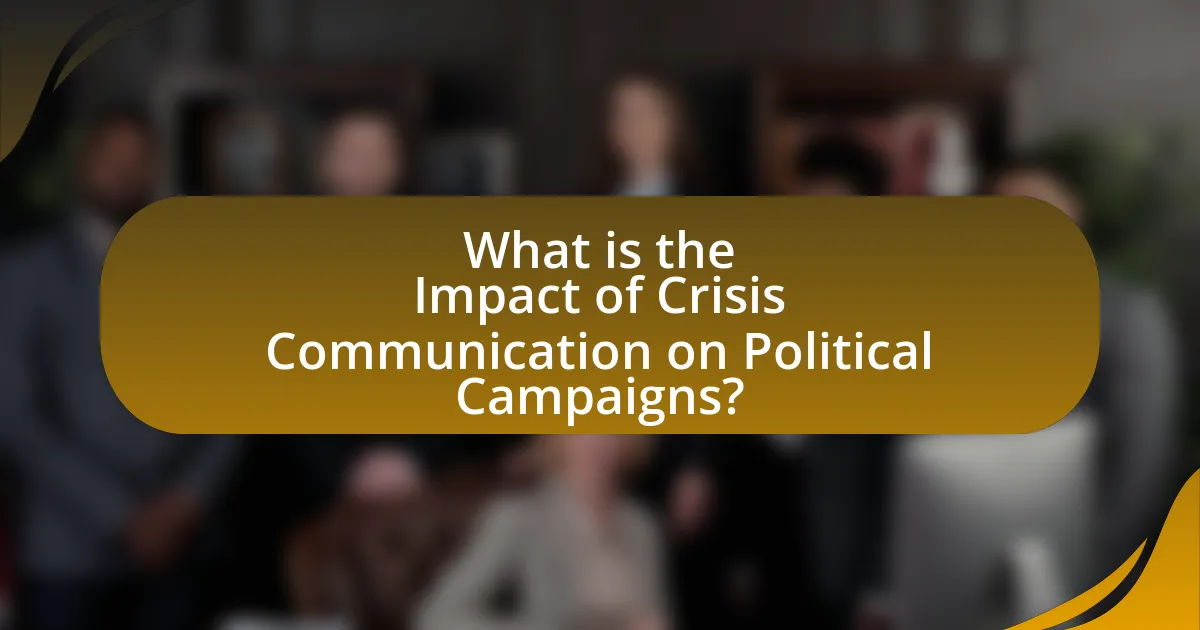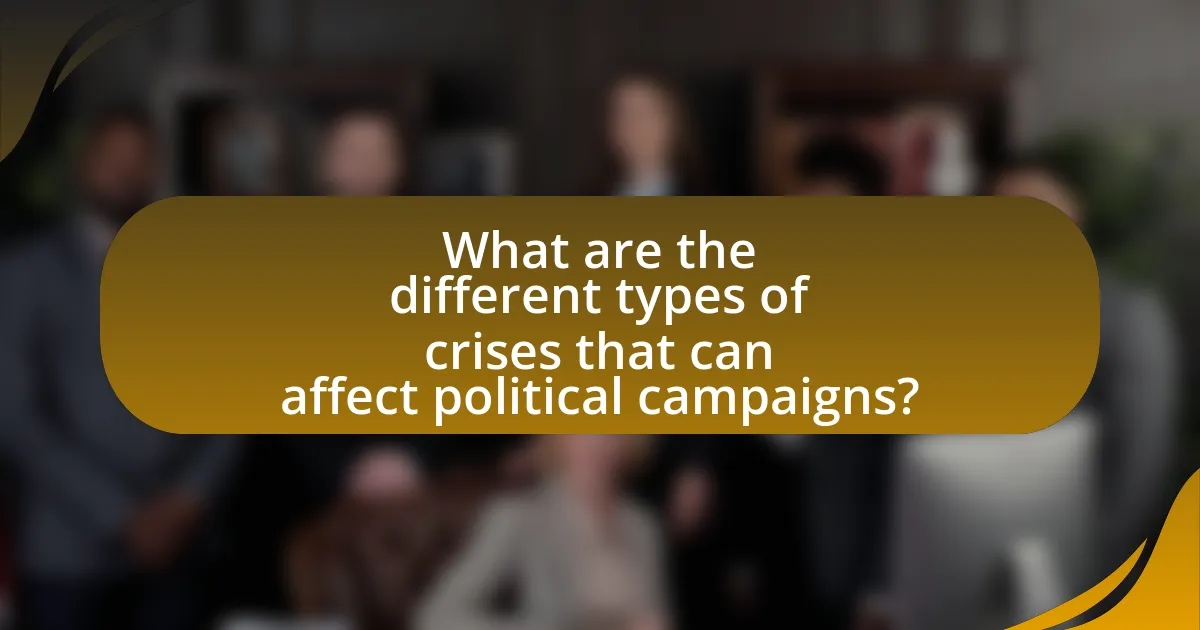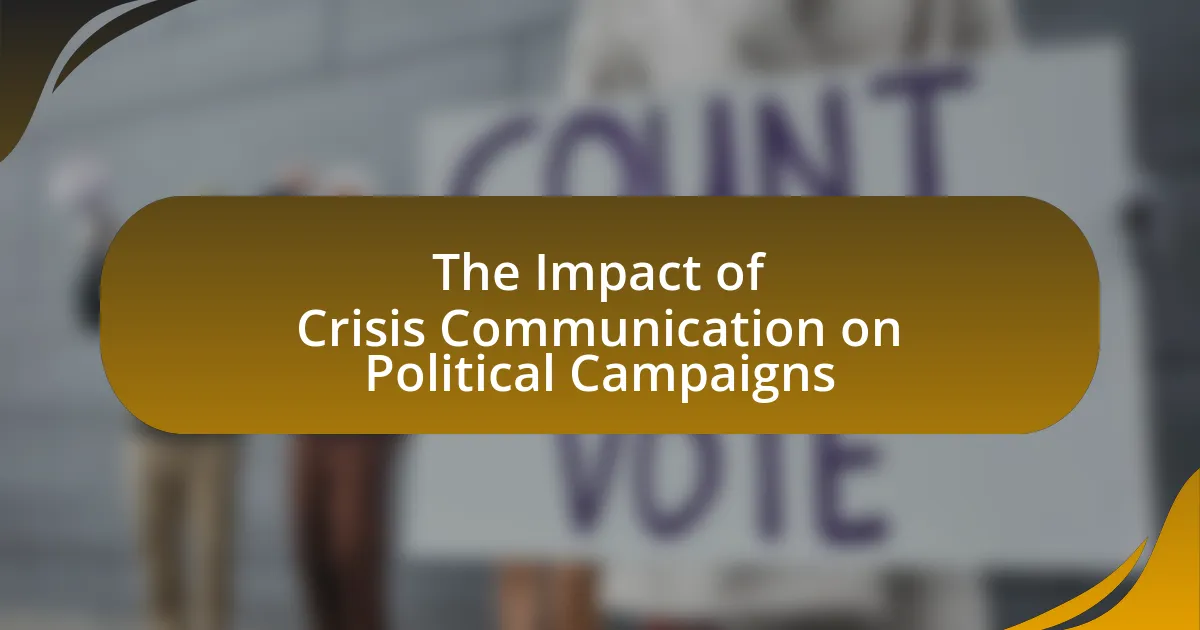Crisis communication plays a crucial role in shaping political campaigns by influencing public perception and voter behavior. Effective strategies, such as transparency, timely information dissemination, and empathy, can enhance a candidate’s credibility and foster voter loyalty, as demonstrated in historical examples like Barack Obama’s 2008 campaign. Conversely, poor crisis management can lead to reputational damage and voter alienation, highlighting the importance of proactive communication plans. The article explores the impact of crisis communication on political campaigns, key elements for success, the consequences of mismanagement, and best practices for candidates to navigate crises effectively.

What is the Impact of Crisis Communication on Political Campaigns?
Crisis communication significantly impacts political campaigns by shaping public perception and influencing voter behavior. Effective crisis communication can mitigate damage to a candidate’s reputation, as seen in the 2008 U.S. presidential election when Barack Obama’s team swiftly addressed controversies, maintaining public support. Conversely, poor crisis management can lead to voter alienation and loss of trust, exemplified by the fallout from the 2016 election controversies surrounding various candidates. Research indicates that timely and transparent communication during crises can enhance credibility and foster voter loyalty, underscoring the critical role of crisis communication strategies in political campaigning.
How does crisis communication influence voter perception during campaigns?
Crisis communication significantly influences voter perception during campaigns by shaping how candidates are viewed in times of turmoil. Effective crisis communication can mitigate negative impacts, restore trust, and enhance a candidate’s image, as evidenced by the 2008 U.S. presidential campaign when Barack Obama’s swift response to the financial crisis helped solidify his leadership image. Research indicates that voters are more likely to support candidates who demonstrate transparency and decisiveness during crises, as seen in studies by the Pew Research Center, which highlight that 70% of voters prioritize a candidate’s crisis management skills. Thus, the manner in which candidates communicate during crises directly affects voter trust and electoral outcomes.
What are the key elements of effective crisis communication in politics?
The key elements of effective crisis communication in politics include transparency, timely information dissemination, empathy, and a clear message. Transparency ensures that political leaders provide honest and open communication about the crisis, which builds trust with the public. Timely information dissemination is crucial, as delays can exacerbate the situation and lead to misinformation. Empathy allows leaders to connect with the emotions of the affected individuals, demonstrating understanding and support. A clear message helps to avoid confusion and ensures that the public receives consistent information. Research indicates that effective crisis communication can significantly influence public perception and voter behavior during political campaigns, as seen in the response strategies employed during the COVID-19 pandemic by various political leaders.
How do different communication strategies affect public trust?
Different communication strategies significantly affect public trust by shaping perceptions and influencing the credibility of information. For instance, transparent communication, which includes sharing accurate data and acknowledging uncertainties, tends to enhance public trust, as evidenced by studies showing that organizations that practice transparency during crises experience higher levels of trust from their stakeholders. Conversely, evasive or misleading communication strategies can erode trust, as seen in political campaigns where candidates who fail to address controversies directly often face skepticism from voters. Research indicates that effective crisis communication, characterized by empathy and responsiveness, can restore trust even after it has been damaged, highlighting the critical role of communication strategies in maintaining and rebuilding public trust.
Why is crisis communication essential for political candidates?
Crisis communication is essential for political candidates because it enables them to manage and mitigate the impact of negative events or controversies on their campaigns. Effective crisis communication helps candidates maintain public trust and credibility during challenging situations, which is crucial for voter support. For instance, during the 2008 presidential campaign, Barack Obama’s team effectively addressed controversies by quickly responding to misinformation, which helped preserve his image and voter confidence. This demonstrates that timely and transparent communication can significantly influence public perception and electoral outcomes.
What role does timely communication play in managing crises?
Timely communication is crucial in managing crises as it helps to mitigate misinformation and maintain public trust. Effective communication during a crisis allows organizations to provide accurate information quickly, which can prevent panic and confusion among stakeholders. For instance, during the COVID-19 pandemic, timely updates from health authorities were essential in guiding public behavior and compliance with safety measures, ultimately influencing the effectiveness of crisis management strategies. Research indicates that organizations that communicate promptly and transparently during crises are more likely to preserve their reputation and stakeholder confidence, as seen in various case studies across political campaigns where swift responses to emerging issues led to better public perception and support.
How can candidates prepare for potential crises during campaigns?
Candidates can prepare for potential crises during campaigns by developing a comprehensive crisis communication plan. This plan should include identifying potential risks, establishing a rapid response team, and creating key messages tailored to various scenarios. Historical examples, such as the 2008 presidential campaign of Barack Obama, demonstrate the effectiveness of having a proactive strategy in place, allowing for quick and coordinated responses to unexpected events. Additionally, regular training and simulations can help campaign staff practice their responses, ensuring they are well-prepared to manage crises effectively.
What are the consequences of poor crisis communication in political campaigns?
Poor crisis communication in political campaigns can lead to significant reputational damage and loss of voter trust. When candidates fail to effectively address crises, they risk alienating their base and creating opportunities for opponents to exploit weaknesses. For instance, during the 2004 U.S. presidential election, the Bush campaign faced backlash for its handling of the Iraq War, which contributed to a decline in approval ratings and voter confidence. Additionally, ineffective communication can result in misinformation spreading rapidly, further complicating the candidate’s position and diminishing their credibility. Studies show that timely and transparent communication can mitigate negative impacts, highlighting the importance of strategic crisis management in maintaining public support.
How can miscommunication lead to voter backlash?
Miscommunication can lead to voter backlash by creating misunderstandings about candidates’ positions or policies. When voters receive unclear or contradictory messages, they may feel confused or distrustful, which can result in decreased support for the candidate. For instance, during the 2016 U.S. presidential election, miscommunication regarding healthcare policies led to significant voter dissatisfaction, particularly among undecided voters, ultimately impacting election outcomes. This illustrates that effective communication is crucial in maintaining voter trust and support.
What historical examples illustrate the impact of crisis mismanagement?
Historical examples that illustrate the impact of crisis mismanagement include the response to Hurricane Katrina in 2005 and the handling of the 2008 financial crisis. In the case of Hurricane Katrina, the Federal Emergency Management Agency (FEMA) faced severe criticism for its slow response and lack of coordination, leading to widespread suffering and loss of life in New Orleans. This mismanagement highlighted the importance of effective crisis communication and preparedness in political leadership. Similarly, during the 2008 financial crisis, the U.S. government’s initial response was perceived as inadequate, contributing to public distrust and economic instability. The failure to communicate effectively about the severity of the crisis and the measures being taken exacerbated the situation, demonstrating how mismanagement can have long-lasting effects on public perception and political capital.
How do political campaigns utilize social media for crisis communication?
Political campaigns utilize social media for crisis communication by rapidly disseminating information, addressing misinformation, and engaging directly with constituents. During a crisis, campaigns leverage platforms like Twitter and Facebook to issue timely statements, clarify facts, and counter negative narratives. For instance, during the 2016 U.S. presidential election, candidates used social media to respond to allegations and manage public perception in real-time, demonstrating the effectiveness of these platforms in shaping narratives. Research indicates that 64% of voters reported using social media to follow political news, highlighting its role in influencing public opinion during crises.
What strategies can enhance crisis communication effectiveness in campaigns?
Effective strategies to enhance crisis communication in campaigns include timely information dissemination, clear messaging, and audience engagement. Timely information dissemination ensures that stakeholders receive updates as events unfold, which can mitigate misinformation and speculation. Clear messaging involves articulating the campaign’s position and actions in a straightforward manner, reducing ambiguity and confusion. Audience engagement, through social media and direct communication channels, fosters trust and allows for real-time feedback, enabling campaigns to address concerns promptly. Research indicates that campaigns employing these strategies can significantly improve public perception and maintain voter support during crises, as evidenced by the successful management of crises in political campaigns like Barack Obama’s 2008 election, where rapid response and transparency were pivotal.

What are the different types of crises that can affect political campaigns?
Different types of crises that can affect political campaigns include scandals, natural disasters, economic downturns, and misinformation. Scandals, such as personal misconduct or corruption allegations, can severely damage a candidate’s reputation and voter trust, as seen in the case of Anthony Weiner’s sexting scandal in 2011, which significantly impacted his political career. Natural disasters, like hurricanes or wildfires, can shift public attention and resources away from campaigns, as observed during Hurricane Sandy in 2012, which altered the dynamics of the presidential race. Economic downturns can lead to voter dissatisfaction and shift priorities, influencing campaign strategies, exemplified by the 2008 financial crisis that reshaped political discourse. Misinformation, particularly through social media, can create confusion and distrust among voters, as demonstrated in the 2016 U.S. presidential election, where false information spread rapidly and affected public perception. Each of these crises requires effective communication strategies to mitigate damage and maintain voter engagement.
How do personal scandals impact a candidate’s campaign?
Personal scandals significantly undermine a candidate’s campaign by damaging their public image and eroding voter trust. When a candidate is embroiled in a scandal, it often leads to negative media coverage, which can overshadow their policy proposals and campaign messages. For instance, a study by the Pew Research Center found that 63% of voters are less likely to support a candidate who has faced personal scandals, indicating a direct correlation between scandal and voter perception. Additionally, scandals can lead to decreased fundraising opportunities, as donors may hesitate to support a candidate with a tarnished reputation. Overall, personal scandals create a challenging environment for candidates, often resulting in diminished electoral support and increased scrutiny.
What are the best practices for addressing personal scandals?
The best practices for addressing personal scandals include immediate acknowledgment, transparent communication, and strategic messaging. Immediate acknowledgment of the issue demonstrates accountability and prevents speculation. Transparent communication involves providing clear, factual information to the public, which helps to build trust and mitigate misinformation. Strategic messaging focuses on framing the narrative positively, emphasizing lessons learned and future commitments to avoid similar issues. Research indicates that effective crisis communication can significantly influence public perception and voter behavior, as seen in political campaigns where timely responses have led to quicker recovery in approval ratings.
How can candidates rebuild their image after a scandal?
Candidates can rebuild their image after a scandal by implementing a strategic crisis communication plan that focuses on transparency, accountability, and proactive engagement with the public. This approach involves acknowledging the scandal, taking responsibility for any wrongdoing, and outlining specific steps for improvement. For instance, historical examples show that politicians like Bill Clinton and Anthony Weiner utilized public apologies and media engagements to address their scandals, which helped them regain some public trust. Additionally, consistent messaging and positive public relations efforts can reinforce a candidate’s commitment to change and rebuild their reputation over time.
What external factors contribute to crises in political campaigns?
External factors that contribute to crises in political campaigns include media scrutiny, public opinion shifts, economic conditions, and social movements. Media scrutiny can amplify minor issues into major crises, as seen in the 2008 U.S. presidential campaign when negative coverage of candidates significantly influenced voter perceptions. Public opinion shifts, often driven by social media, can rapidly change the narrative around a candidate, as demonstrated during the 2016 election when viral misinformation affected candidate reputations. Economic conditions, such as recessions, can lead to heightened voter dissatisfaction and scrutiny of candidates’ policies, impacting their campaign stability. Lastly, social movements, like the Black Lives Matter movement, can create crises for campaigns that fail to address relevant social issues, as seen in various elections where candidates faced backlash for perceived insensitivity.
How do media coverage and public opinion shape crisis responses?
Media coverage and public opinion significantly shape crisis responses by influencing the perception and urgency of the situation. When media outlets report extensively on a crisis, they can amplify public concern, prompting quicker and more decisive actions from political leaders and organizations. For instance, during the COVID-19 pandemic, extensive media coverage of rising case numbers and public health implications led to swift government responses, including lockdowns and vaccination campaigns. Additionally, public opinion, often gauged through polls and social media sentiment, can pressure decision-makers to align their responses with the prevailing attitudes of the populace. Research by the Pew Research Center indicates that public perception can sway political leaders to adopt more proactive measures in response to crises, as seen in environmental disasters where public outcry has led to legislative changes. Thus, the interplay between media coverage and public opinion creates a dynamic that shapes the effectiveness and timeliness of crisis responses.
What role do political opponents play in escalating crises?
Political opponents play a significant role in escalating crises by amplifying existing tensions and framing narratives that can provoke public outrage. During a crisis, opponents often seize the opportunity to criticize the actions or inactions of those in power, which can lead to increased polarization among the electorate. For instance, during the COVID-19 pandemic, political rivals used social media platforms to highlight perceived failures in government response, which contributed to heightened public anxiety and distrust. This behavior is supported by research indicating that adversarial political communication can exacerbate societal divisions and intensify the urgency of crises, as seen in various electoral contexts where opponents leverage crises to gain political advantage.

How can political candidates effectively manage crises?
Political candidates can effectively manage crises by implementing a strategic communication plan that prioritizes transparency, timely responses, and audience engagement. This approach allows candidates to control the narrative, mitigate misinformation, and maintain public trust. For instance, during the 2008 financial crisis, Barack Obama’s campaign effectively communicated his economic policies and reassured voters, which contributed to his electoral success. Research indicates that candidates who respond quickly and openly to crises can reduce negative perceptions and enhance their credibility, as demonstrated in studies by the Pew Research Center, which highlight the importance of swift communication in maintaining voter confidence during turbulent times.
What are the key steps in developing a crisis communication plan?
The key steps in developing a crisis communication plan include identifying potential crises, establishing a crisis communication team, creating a communication strategy, developing key messages, and conducting training and simulations. Identifying potential crises involves analyzing risks that could impact the organization, while establishing a crisis communication team ensures that there are designated individuals responsible for managing communication during a crisis. Creating a communication strategy outlines how information will be disseminated, including channels and timing. Developing key messages ensures consistency and clarity in communication, and conducting training and simulations prepares the team to respond effectively. These steps are essential for maintaining public trust and managing the narrative during a crisis, as evidenced by successful crisis management cases in political campaigns where timely and effective communication mitigated negative impacts.
How can candidates identify potential crises before they occur?
Candidates can identify potential crises before they occur by conducting thorough risk assessments and monitoring public sentiment. Risk assessments involve analyzing past incidents, current events, and vulnerabilities within the campaign that could lead to crises. Monitoring public sentiment through social media analytics and opinion polls helps candidates detect emerging issues or negative trends early. For instance, a study by the Pew Research Center found that 69% of adults in the U.S. use social media, making it a valuable tool for gauging public opinion and identifying potential crises. By combining these strategies, candidates can proactively address issues before they escalate into crises.
What tools and resources are available for crisis management?
Crisis management tools and resources include communication platforms, crisis management software, and training programs. Communication platforms such as social media and press release services enable rapid dissemination of information during a crisis. Crisis management software, like Everbridge and CrisisGo, provides organizations with the ability to manage incidents, coordinate responses, and communicate effectively with stakeholders. Training programs, including simulations and workshops, equip teams with the skills necessary to handle crises effectively. According to a study by the Institute for Public Relations, effective crisis communication can significantly mitigate reputational damage, underscoring the importance of these tools in political campaigns.
What lessons can be learned from past political crises?
Past political crises reveal the importance of effective communication strategies in maintaining public trust and managing perceptions. For instance, during the Watergate scandal, President Nixon’s failure to communicate transparently led to a significant loss of credibility and ultimately his resignation. This illustrates that timely and honest communication can mitigate damage and preserve political capital. Additionally, the handling of the 2008 financial crisis demonstrated that clear messaging from leaders can help stabilize markets and public sentiment, as seen when then-Treasury Secretary Henry Paulson communicated the urgency of the situation. These examples underscore that proactive and transparent crisis communication is essential for political leaders to navigate challenges successfully and maintain public confidence.
How can historical case studies inform current campaign strategies?
Historical case studies can inform current campaign strategies by providing insights into effective crisis communication tactics. For instance, the 2008 Obama campaign utilized social media to address controversies and engage voters, demonstrating the importance of timely and transparent communication. This approach is supported by research indicating that campaigns that respond quickly to crises can mitigate negative impacts and maintain public trust. Analyzing past campaigns reveals patterns in voter behavior and the effectiveness of various messaging strategies, allowing current campaigns to tailor their responses based on proven outcomes.
What common mistakes should candidates avoid during a crisis?
Candidates should avoid making hasty statements during a crisis, as this can lead to misinformation and damage their credibility. Quick, unverified responses often result in public backlash and can exacerbate the situation, as seen in various political campaigns where leaders faced criticism for not thoroughly assessing the facts before speaking. Additionally, failing to communicate consistently with their team can create confusion and mixed messages, undermining the campaign’s overall strategy. Historical examples, such as the response strategies during the 2008 financial crisis, illustrate that clear, coordinated communication is essential for maintaining public trust.
What practical tips can enhance crisis communication in political campaigns?
Effective crisis communication in political campaigns can be enhanced by implementing clear messaging, timely responses, and proactive engagement with the media. Clear messaging ensures that the campaign’s position is articulated without ambiguity, which helps to prevent misinformation. Timely responses are crucial; research indicates that addressing issues within the first hour can significantly mitigate damage, as seen in the 2016 U.S. presidential election when rapid responses helped shape narratives. Proactive media engagement fosters relationships that can be beneficial during crises, allowing campaigns to control the narrative more effectively. These strategies collectively contribute to maintaining public trust and minimizing negative impacts during crises.
